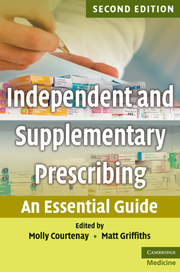Book contents
- Frontmatter
- Contents
- List of contributors
- Foreword to the second edition
- Preface to the second edition
- 1 Non-medical prescribing: an overview
- 2 Non-medical prescribing in a multidisciplinary team context
- 3 Consultation skills and decision making
- 4 Legal aspects of independent and supplementary prescribing
- 5 Ethical issues in independent and supplementary prescribing
- 6 Psychology and sociology of prescribing
- 7 Applied pharmacology
- 8 Monitoring skills
- 9 Promoting concordance in prescribing interactions
- 10 Evidence-based prescribing
- 11 Extended/supplementary prescribing: a public health perspective
- 12 Calculation skills
- 13 Prescribing in practice: how it works
- 14 Minimising the risk of prescribing error
- Index
- References
7 - Applied pharmacology
Published online by Cambridge University Press: 10 January 2011
- Frontmatter
- Contents
- List of contributors
- Foreword to the second edition
- Preface to the second edition
- 1 Non-medical prescribing: an overview
- 2 Non-medical prescribing in a multidisciplinary team context
- 3 Consultation skills and decision making
- 4 Legal aspects of independent and supplementary prescribing
- 5 Ethical issues in independent and supplementary prescribing
- 6 Psychology and sociology of prescribing
- 7 Applied pharmacology
- 8 Monitoring skills
- 9 Promoting concordance in prescribing interactions
- 10 Evidence-based prescribing
- 11 Extended/supplementary prescribing: a public health perspective
- 12 Calculation skills
- 13 Prescribing in practice: how it works
- 14 Minimising the risk of prescribing error
- Index
- References
Summary
Clinical pharmacology is defined as the application of scientific principles to understanding the ways in which drugs behave and work in humans (Weatherall et al.2006).
A good general understanding of basic pharmacology and how it is applied to the treatment of patients is essential for any prescriber. It is not enough to have knowledge of how an individual drug may exert its effect. A prescriber must also understand how differences in individuals and populations may alter this effect. This understanding will allow prescribers to make decisions about routes of administration, dosing, frequency of administration, contraindications, adverse effects and interactions with other drugs. In order to be able to prescribe appropriately and effectively, prescribers need to appreciate the concepts of how the body handles drugs, i.e. pharmacokinetics and how these may be altered or influenced and, once in the body, how drugs can exert their effect and what may alter this potential effect, i.e. pharmacodynamics.
This chapter covers the essential elements of basic applied pharmacology. It will aim to give readers an overview of the general concepts of both pharmacokinetics and pharmacodynamics and how these influence drug choice, dose and effect. It will also briefly cover adverse drug reactions and interactions, how these may occur and what the prescriber can do to minimise these where possible. Finally, it will bring the knowledge of these concepts together in order to provide a practical framework for individualising drug therapy.
- Type
- Chapter
- Information
- Independent and Supplementary PrescribingAn Essential Guide, pp. 65 - 85Publisher: Cambridge University PressPrint publication year: 2010
References
- 1
- Cited by



